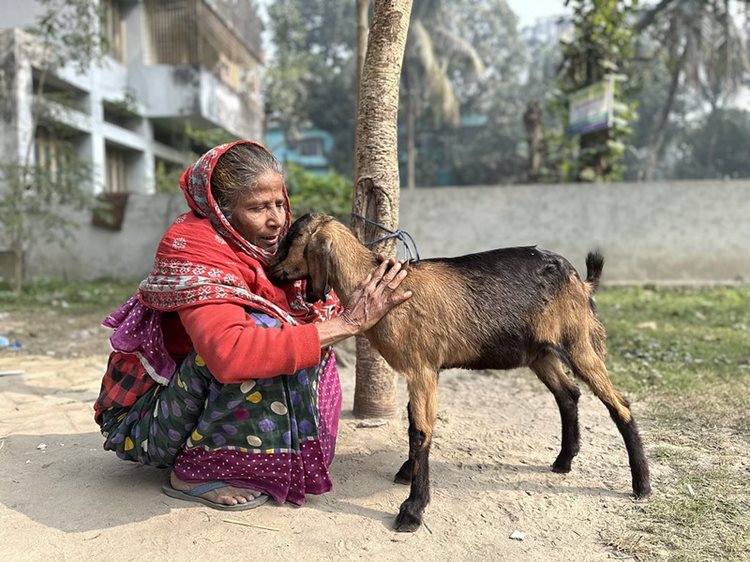In Bangladesh, cold chain improvements for livestock vaccines are benefiting livestock keepers, who depend on their animals for sustenance and to cope with unpredictable weather events.
Banner image: Asma Khatun, Borkot Mia, and their cow, Shundori.
Maherun Begum, a resident of Rangpur, Bangladesh, arrived at the Upazila Livestock Office and Veterinary Hospital to seek treatment for her goat, which was suffering from influenza. Begum previously vaccinated her goat at this hospital, showcasing her proactive approach to animal healthcare. Raising goats constitutes a crucial source of income for her family.
In Bangladesh, livestock holds deep cultural significance, with families tending to cows, goats, and chickens for generations. And in areas like Rangpur, an economically distressed region in the northernmost part of the country, the impact of climate change on paddy and other crop production has elevated livestock rearing to an important method for families to cope with unpredictable weather events and changing growing seasons. Livestock also serve as companions and symbols of prosperity. Each dawn, farmers tend to their animals with care milking cows, feeding chickens, and grazing goats. Livestock products serve beyond sustenance; they symbolize resilience amidst life's challenges.

Maherun Begum brought her goat to Upazila Livestock Office and Veterinary Hospital, Rangpur for vaccination.
Veterinary inputs produced at Bangladesh’s Livestock Research Institute (LRI), which operates under the Department of Livestock Services, are part of efforts by government and the livestock industry to prevent and control diseases like foot-and-mouth disease, Newcastle disease, and avian influenza, reducing production losses, increasing productivity, and enhancing the quality and market value of animals and animal-source products. Vaccines also contribute to public health by reducing the risk of zoonotic diseases. LRI produces 17 vaccines, including those for foot-and-mouth disease, and distributes the products to the rural Upazila area. The total number of doses produced each year exceeds 320 million doses. Thus, LRI plays a major role in controlling and eradicating animal diseases and carries weight within on Bangladesh's agricultural economy.
An assessment by the U.S. Department of Agriculture (USDA) Bangladesh Trade Facilitation project (BTF), however, found many inefficiencies in the distribution of veterinary pharmaceutical products. LRI depended on public transportation and handheld cool boxes to collect and transport vaccines and a lack of temperature controls led to a loss of efficacy and reduced shelf life of the vaccines. Experts from BTF proposed proper storage and transportation techniques and recommended the required temperatures to preserve vaccine viability and safeguard animal health and therefore farmer livelihoods. To respond to the problem, BTF donated two refrigerator-freezer vans and equipment to the Department of Livestock Services, enabling LRI to improve the efficiency of distributing veterinary vaccines and medicines across Bangladesh and to address concerns regarding vaccine efficacy and wastage.
During a recent visit to the District Livestock Office Borkot Mia and Asma Khatun inquired if the vaccines offered for farmers at a subsidized rate had been maintained under proper cold chain conditions. Mia and Kahatun raise goats and dairy and beef cattle and depend on livestock production as their livelihood. In the past, they suffered significant losses in their cattle due to the unavailability of proper vaccines. The medicine that they purchased from the local veterinary center had not been properly handled and kept at the required temperature during transport from the capital Dhaka, rendering them ineffective. As a result, they lost several cows to foot-and-mouth disease. "It's not just about timely vaccines; it's about saving [our animals’] lives. We've known the anguish of waiting, the fear of not getting vaccines on time. Now, with LRI’s cool van, hope arrives precisely when we need it most,” said Borkot Mia.
 USDA BTF donated a freezer van to the doorstep of Dinazpur Livestock Office. The van helps maintain proper storage temperatures for livestock vaccines.
USDA BTF donated a freezer van to the doorstep of Dinazpur Livestock Office. The van helps maintain proper storage temperatures for livestock vaccines.
Dr. Enamul Haque, Rangpur District Livestock Officer explained, "Previously, most of the time, we had to send staff from the district by bus or motorbike to LRI in Dhaka to collect vaccines with a standard cooling box and some ice. In this process, it was impossible to control, or even know the temperature at which the products were kept. The cold chain broke almost every time. But now, with the support of the freezing van, we receive the vaccines at our doorstep, and the products have been maintained with proper temperature controls." Because of the generous support from USDA, when Begum, Mia, and Khatun purchase veterinary vaccines and medicine they have confidence that the medicine will work and that the health of their beloved animals will be safeguarded.
The Bangladesh Trade Facilitation project is funded through the U.S. Department of Agriculture’s Food for Progress program. The project’s goal is to expand trade in agricultural goods by addressing systemic constraints; one objective is to facilitate private and public investment in cold storage and temperature-controlled logistics. The project has partnered with the Department of Livestock Services to transform and modernize the provision of trade services.